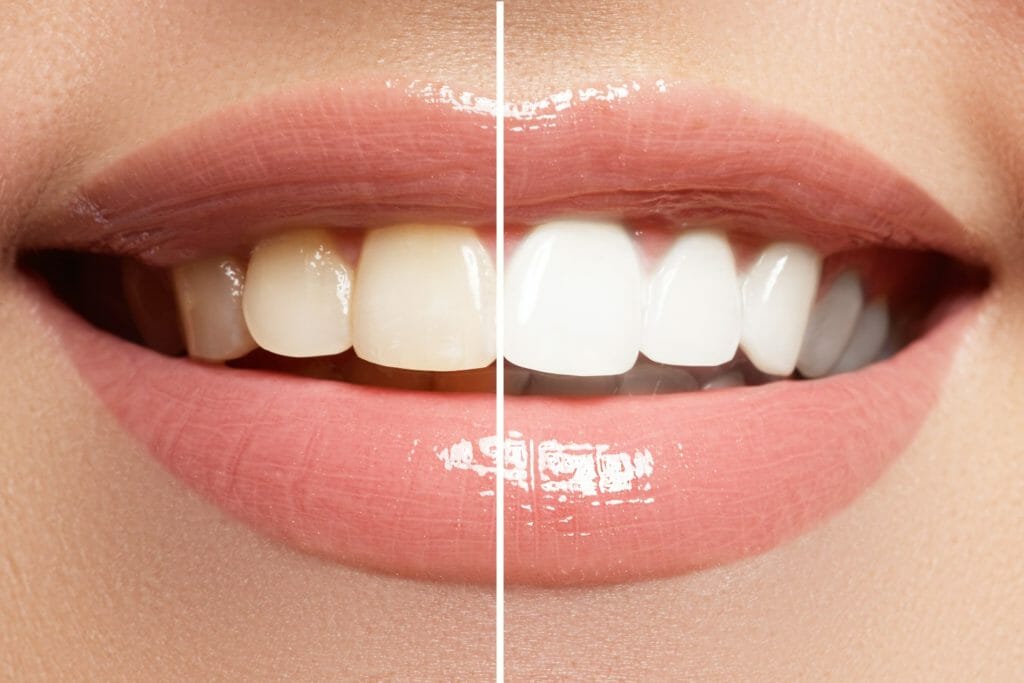A bright, white smile is a signal of good health, youthfulness, and confidence. Tooth whitening is an increasingly popular cosmetic dental treatment that can result in dramatic improvements in the appearance of teeth. In this blog, we will cover everything you need to know about tooth whitening from an overview of what it is to the different types of teeth whitening systems available. We will also delve into the benefits of tooth whitening and the potential risks associated with it. Lastly, we will discuss the latest developments in bleaching research, so you can stay up-to-date on the most innovative and effective ways to achieve a brighter, healthier-looking smile.
Overview of Teeth Whitening
Teeth whitening is a cosmetic procedure that involves using a bleaching agent (such as carbamide peroxide) to change the color of the enamel of your teeth. While some toothpaste and at-home kits claim to whiten teeth, the best results come from a professional whitening session done by a dental professional. At-home professional whitening kits can cost anywhere from $100 to $400, while in-office whitening procedures could cost around $650. The in-office whitening procedure can take 60 to 90 minutes and involves prepping the teeth and isolating the mouth with gauze. A peroxide-based gel is applied, and a specialized light is used to help activate the gel. The end result is teeth that are several shades whiter, making it a popular choice for those seeking a quick and dramatic improvement to their smile. However, it’s important to note that tooth whitening is not recommended for everyone and may cause tooth sensitivity or other potential side effects, so it’s always best to consult with a dental professional first.
Types of Teeth Whitening Systems
Teeth whitening is a cosmetic dentistry procedure that involves removing stains and discoloration from teeth. There are different ways to whiten teeth, such as whitening toothpaste, home-use whiteners, and in-office whitening. Whitening toothpaste works best for removing surface stains and can help brighten teeth over days or weeks. Home-use whiteners use peroxide and can range in strength from 10-20%. In-office whitening is done by professionals and is the strongest option.
However, it is recommended to talk to your dentist before trying any whitening treatment, especially if you have sensitive teeth or restorations. Teeth whitening is safe when done under the guidance of a dental professional, but some people may experience sensitivity or damage if they attempt to whiten their teeth too aggressively or use the wrong type of treatment. It is always better to be cautious and consult a professional before proceeding with any whitening procedures.
Benefits of Tooth Whitening
Teeth whitening is a popular cosmetic treatment that can provide significant benefits. It’s a quick and effective way to whiten teeth and remove stains caused by food, drinks, or smoking. Over-the-counter kits are affordable and can cost as little as $20, while in-office procedures can set you back up to $1000. Professional whitening by a dentist is generally more expensive, costing between $300-$800, but it is a safe and effective way to remove stains from your teeth. It’s important to note that tooth whitening may not be effective on restorative materials such as porcelain or crowns. Ultimately, tooth whitening is an easy way to boost your confidence and smile brighter!
Risks Associated with Tooth Whitening
Tooth whitening is a common cosmetic procedure that can help improve the appearance of teeth. However, it’s essential to consider the risks associated with the procedure. The temporary sensitivity and mild irritation of soft tissues in the mouth, such as the gums and lips, are the most common side effects of teeth whitening. Tooth sensitivity can last several days, while gingival irritation can begin within one day of treatment. Furthermore, in-vitro studies report additional risks such as tooth erosion, tooth mineral degradation, increased susceptibility to demineralization, and pulpal damage. Bleaching agents like carbamide peroxide used for intrinsic whitening can cause extrinsic teeth discoloration. Existing dental work like crowns and bridges is at risk of damage during the procedure. Patients should discuss all potential risks with their dentist before undergoing tooth whitening.
Latest Developments in Bleaching Research
Bleaching teeth has been a popular cosmetic dental treatment for decades, with new developments constantly emerging. According to a systematic review by Buchalla and Attin in 2007, external bleaching therapies with activation by heat, light, or laser can be effective for whitening teeth. A meta-analysis conducted by He et al. in 2012 found that light could potentially reduce sensitivity during in-office vital bleaching. More recently, a comprehensive review by Omar et al. in 2019 concluded that home bleaching with professional prescriptions was safer than using non-prescription bleaching products. Scientists are working on developing bacteria-based bleaching agents, which could be part of the future of tooth whitening. Additionally, new bleaching agents and technologies are emerging that reduce damage to teeth enamel. As technology advances, further research and development in tooth whitening are expected to provide safer and more efficient treatments.
Conclusion
In conclusion, tooth whitening can enhance the natural beauty of your smile and boost your confidence. There are various types of teeth whitening systems you can choose from, depending on your preference and budget. However, it’s important to be aware of the risks associated with tooth whitening, which include tooth sensitivity and gum irritation. It is always advisable to consult your dentist before you embark on any tooth whitening procedure. With constant research and development, the latest advancements in bleaching research can offer you safer and more effective tooth whitening options. Schedule an appointment with Linworth Family Dental today!



It’s great that you mentioned that tooth whitening can enhance the natural beauty of your smile. I would think that you would want to have a beautiful smile if you are someone that has to talk to a lot of people for a living. Having a good smile would make you more approachable and make it easier for potential customers to want to talk to you.